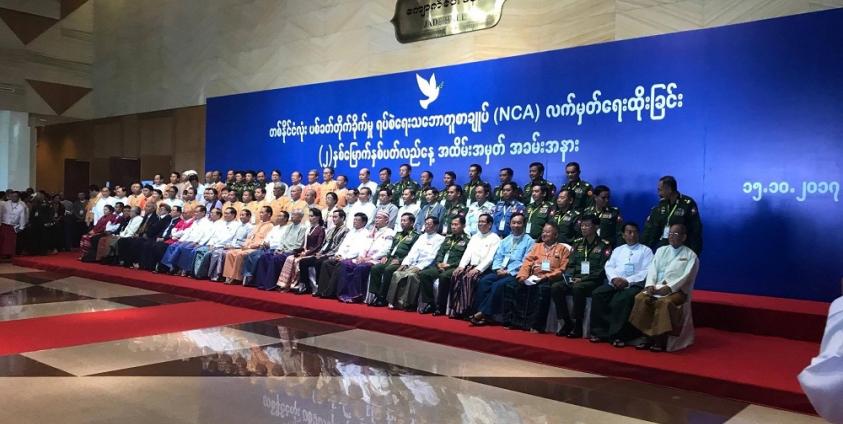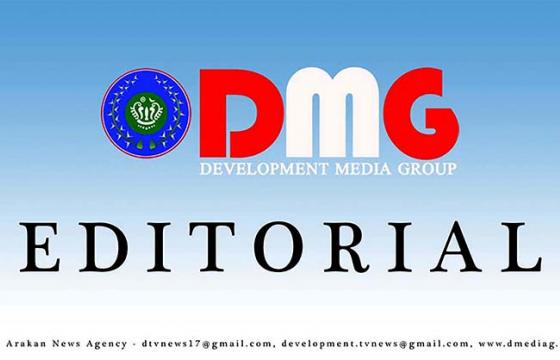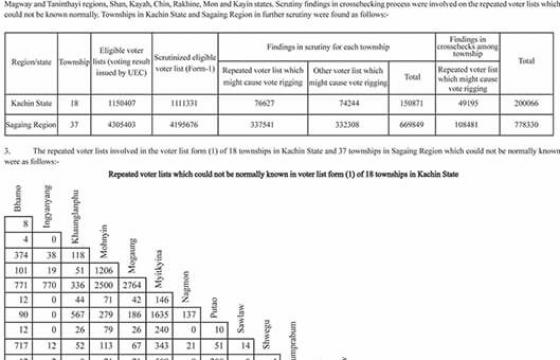The second anniversary of Nationwide Ceasefire Agreement (NCA) was held on 15 October 2017 in Naypyitaw at the Myanmar International Convention Center – 1, attended by State Counselor Aung San Suu Kyi, Chairperson of the National Reconciliation and Peace Center (NRPC), President Htin Kyaw, Vice Presidents Myint Swe and Henry Van Thio, Commander-in-Chief of the Defense Services Senior General Min Aung Hlaing and General Saw Mutu Sae Poe, who is Chairman of the Karen National Union (KNU) and also represents the signatory armed groups to the ceasefire agreement.
Reportedly, representatives from political parties, witnesses of NCA Signing, members of Union Peace Dialogue Joint Committee (UPDJC), committee members of Ceasefire Union Joint Monitoring Committee (JMC-U), signatories of Ethnic Armed Organizations (EAOs), diplomats, representatives from international organizations, businessmen and invited guests were present at the anniversary occasion among others.
The NCA was initiated on Oct. 15, 2015 during the previous Thein Sein’s government tenure. A third meeting of Union Peace Conference – 21st Century Panglong (UPC-21CP) is scheduled for later this year and Myanmar plans to hold another two meetings of the peace conference in 2018, according to Aung San Suuu Kyi.
In order to assess or determine the peace negotiation process after two years of signing of the NCA and in which direction the political wind is blowing, let us examine the three stakeholders speeches given at this anniversary occasion.
Aung San Suu Kyi
Suu Kyi talked about her government’s inheritance of the NCA from the previous regime in 2016 and some achievement in establishing the JMC and could be taken as a positive step in instilling a culture of negotiation to settle the dispute. She said other than that it was instrumental in decreasing the armed clashes to a certain extend benefiting the population in the areas of signatory EAOs. The UPDJC was also able to produce the Union Accord’s first agreement of 37 fundamental principles on federalism during the successfully launched UPC-21CP from May 24 to 29 of this year.
Her speech main thrust is the unmistakably wooing of the NCA non-signatories to become part of the peace process.
She reiterated he usual urging and said: “When the government initiated the peace process, some groups were still under negotiation and some had not accepted the NCA yet. For those non-signatory groups, we are ready to welcome them and look forward to initiate peace negotiations.”
“Our political dialogues were aimed to achieve fundamental principles acceptable to all. Our government welcomes all non-signatory groups to participate in the process of formulating the principles towards a Democratic Federal Union in the future. In fact, the NCA is not an end in itself, but just the first step towards national reconciliation in the country,” she explained.
She then explicitly stressed: “I would like to reiterate today that the NCA opens the door for political dialogues which will pave the way to the Union Peace Conference.”
Min Aung Hlaing
The Commander-in-Chief emphasized the role of the Military or Tatmadaw in Myanmar’s democratization process.
He said: “ Since it assumed the State duties in 1988, the Tatmadaw government had been carrying out political, economic and social development undertakings till 2010. The Tatmadaw government held the National Convention with the involvement of the representatives of all walks of life and all strata of life of the people to adopt a Constitution suitable for a democratic state.”
He also try to justify the Military’s commitment to reform in an evolutionary way of democratization by saying: “The Tasks which were compatible with the democracy system were implemented simultaneously. For example, Tatmadaw officers were assigned as chairmen of township and district administrative bodies, but later administrators of the General Administration Department were assigned to the job to build the administrative pillar under democratic system.”
Regarding the type of federal system the Tatmadaw envisaged he repeated the vaguely defined line as usual: “The first basic principle guaranteed “the Union based on democracy and federal system with full rights and guarantees of democracy, national equality and self-administration.””
His message as usual urged the non-signatory EAOs to sign the NCA. He said: “All armed ethnic organizations must sign the NCA. Some organizations said it does not need to sign the NCA because there is no firing and attacks. In fact, the NCA means an agreement of ceasefire. Actually, its essence is wider and deeper. So, I firmly ask you to sign the NCA.”
He further stressed that the NCA was formulated in a democratic way which means it is an agreement of majority and cooperation, adding: “The NCA was drawn by the government, the Tatmadaw and all armed ethnic organizations based on initial proposals of armed ethnic organizations, not by individual or single organization.”
He finally drive home his point by saying: “No provision in this agreement limits or restricts the rights of people, but provide every possible right for them. It is therefore fair to assume that continued ignoring of this fact amounts to resisting the federal union which people aspire to, opposing democracy, having desire for armed ‘anarchy’, and disregarding the interests of the Union and its people.”
Mutu Say Poe
The KNU leader main message was the adherence to the Panglong Agreement, signed on 12 February 1947 between General Aung San, representing an interim government of Burma Proper or Ministerial Burma, and the ethnic nationalities’ leaders, which emphasized mutual respect for each other, guaranteed democracy, national equality and rights of self-determination in building a federal union.
He pointed out the broken promises made in the treaty by saying: “All indigenous peoples (Thaingyintha) were able to achieve independence through the signing of Panglong Agreement. The Union was also established. But until today we are unable to realize the Panglong Agreement to the fullest (of its meaning), especially the paragraph 5 which guaranteed “self-rule and self-administration within the region” still cannot be implemented. Also Panglong Agreement paragraph 7 still cannot be implemented.”
He further said that failure to implement the Panglong Agreement to the fullest of its intention is the main cause of the ongoing civil war and that was why we have to be holding peace negotiation and political dialogue through the UPC-21CP.
In addition, Mutu Say Poe pointed out the shortcomings in implementing the NCA as that Joint Implementation Coordinating Meeting (JICM), the highest organ in the NCA, which should be held every three months has not been regularly called; inability to from JMC at state-level although some could be established in some states, making it difficult for actual implementation on the ground; UPDJC unable to finish the Framework for Political Dialogue (FPD); and NCA signatory EAOs unable to hold national-level political dialogue as prescribed by the NCA.
Meanwhile, Central Standing Committee of the KNU issued an eight-point statement which mostly echo its Chairman’s speech of 15 October and also touch on a controversial issue of Rakhine conflict, which wrote: “The handling of the crisis in Northern Rakhine by the government and the Tatmadaw brings the memory of what the KNU and the Karen people have experienced under the state’s four-cut policy through various forms of aggressive military operations that caused over 200,000 Karen people to become internally displaced persons (IDPs) and over 150,000 to become refugees.”
The statement further stressed: “The KNU regrets witnessing the repeat of this history while efforts to achieve peace are being made, and is gravely concerned that the peace process will be derailed. Therefore, the KNU urges the government and Tatmadaw to seek politically dignified and non-violent ways to address the current crisis.”
Outlook
Given such positioning of the stakeholders and some 70% of the ethnic fighting force still unable to join the peace process, plus the ongoing armed conflict in Kachin and Shan States, including the Rakhine crisis which the UN and international actors are forced to get involved, the whole peace process could only be taken as being stagnated, if not getting worse, regardless of how the powers that be in in Myanmar would like to think for itself.
State Counselor and Commander-in-Chief seem to be on the same page regarding the signing of the NCA by the non-signatory EAOs, the Panghsang seven-party alliance or Federal Political Negotiation and Consultative Committee (FPNCC) and the four-party membership United Nationalities Federal Council (UNFC).
The onuses boil down to the need to change the mindset based on altruistic-thinking that would lead to flexibility and accommodation; and to instill the often urged “political will” that could actually usher in a new era of political reconciliation and settlement.
In concrete terms, it would mean agreeing on the common cause of peaceful co-existence on ethnic equality basis; accepting all-inclusiveness of EAOs in words and deeds; declaring unilateral ceasefire nationwide by the government to show its generosity and largesse; and honoring the Panglong Agreement of 1947, which is the sole legal bond between the Bamar and the other ethnic nationalities.
Failing to follow all these and interpreting the legal bond of Panglong Agreement accordingly to suit the view of the government and Military – like honoring the spirit and not the agreement – would only prolong the war and ethnic conflict further, which is not an outcome that would benefit any party, if decades-long civil war is to be seen as an indication.






